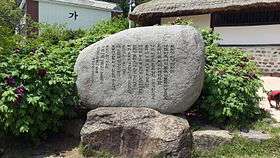Gim Yeong-rang
| Gim Yeong-rang | |
| Hangul | 김영랑 |
|---|---|
| Hanja | 金永郞 |
| Revised Romanization | Gim Yeongnang |
| McCune–Reischauer | Kim Yŏngnang |
| Birth name | |
| Hangul | 김윤식 |
| Hanja | 金允植 |
| Revised Romanization | Gim Yunsik |
| McCune–Reischauer | Kim Yunsik |
Kim Yeong-nang (January 16, 1903 – September 29, 1950) was a Korean writer from Gangjin county, South Jeolla province, in present-day South Korea, where he spent most of his life. He participated in the Korean independence movement and as a teenager was jailed for six months in Daegu. Though he was a noted performer of traditional Korean music, he also loved classical Western music and was one of the few of his time who could read and appreciate English language poetry, Keats and Yeats being among his favorites.
When the Japanese oppression was at its height, he alone in Gangjin refused to change his name or offer worship at the Shinto shrine. Many of his earlier poems clearly express opposition to Japanese rule, and after Korea’s liberation in 1945 he voiced his disquiet at the political polarisation that was tearing the country apart. When the growing unrest came to threaten the life of his family, he moved to Seoul, where he died as the result of a shrapnel wound to the stomach during the Korean War.
Writing

Under the penname Yeongrang, Kim Yeong-nang was especially active in literature during the 1930s and 1940s. Most of his poems experiment with modernism at the same time as exploring native Korean rhythms and he was well known for writing in the unique Jeolla dialect. Partly this was because Japanese prohibitions led patriotic Koreans to emphasise traditional aesthetics.[1]
His translator, Brother Anthony of Taizé, has commented on the poet's reputation that it is currently growing in Korea. At first he tended to be overlooked in political times because he was only briefly in prison (in 1919), and later because he died before the post-Liberation literary influences and cliques formed. For a long time he was known only as the writer of a single poem, the much anthologized ("Until Peonies Bloom").[2] The Government's posthumous presentation in 2008 of its highest award for achievement in the field of culture, the Gold Crown Order of Cultural Merit, set the seal on his recognition. The recent translation of his complete poems is now bringing him to the attention of those outside his country.
Poet of the Resistance
Kim Seon-tae has pointed out in the introduction to his work that Kim risked his life by expressing constant, intense anti-Japanese sentiments in his poetry, and these were particularly apparent in the poems he wrote between 1938-40. Not only does “Geomungo” (거문고) appeal to the Korean cultural past, but its reference to the Japanese and to collaborators among his countrymen is overt:
검은 벽에 기대선 채로 |
While the year has changed twenty times |
The geomungo is a six-stringed Korean zither, an instrument favored by scholars in the past. Here it is identified with the kirin of folklore, a hybrid creature that is normally gentle but becomes fierce if a pure person is threatened by the wicked. Like, for example, the wolfish Japanese, and those among the subservient Koreans who ape them.
References
- Most biographical and stylistic information is drawn from Until Peonies Bloom: The Complete Poems of Kim Yeong-nang (details below)
- ↑ Ramesh Sharma, “New trends in modern literature” in East Asian Literatures: Japanese, Chinese and Korean, Delhi 2006, p.102
- ↑ Korean Studies
- ↑ Brother Anthony's translation
External links
- Biographical information and list of major works
- Brother Anthony of Taizé, Until Peonies Bloom: The Complete Poems of Kim Yeong-nang, ISBN 978-1-937385-03-3, University Of Hawai'i 2010.